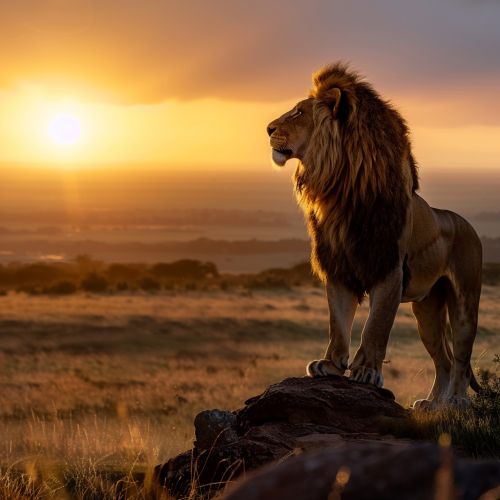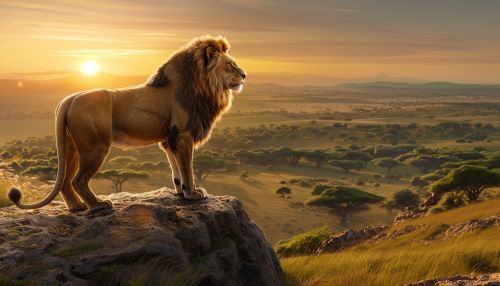The Lion King
Overview
"The Lion King" is a seminal animated feature film produced by Walt Disney Feature Animation and released by Walt Disney Pictures in 1994. Directed by Roger Allers and Rob Minkoff, the film is renowned for its groundbreaking animation, compelling narrative, and memorable musical score. The story is set in the Pride Lands of Africa and follows the journey of a young lion named Simba as he grows from a cub into the rightful king of the savannah.
Plot Synopsis
The narrative of "The Lion King" revolves around the life of Simba, a lion cub who is destined to succeed his father, Mufasa, as king of the Pride Lands. The film opens with the iconic "Circle of Life" sequence, introducing the audience to the diverse animal kingdom and the birth of Simba.
Early Life
Simba's early life is marked by innocence and curiosity. Under the guidance of his father, Mufasa, Simba learns about the responsibilities of kingship and the delicate balance of the ecosystem. Mufasa's teachings emphasize the Circle of Life, a concept that underscores the interconnectedness of all living things.
Tragedy and Exile
The tranquility of Simba's life is shattered by the malevolent actions of his uncle, Scar. Scar, driven by jealousy and ambition, orchestrates Mufasa's death and manipulates Simba into believing that he is responsible for the tragedy. Overwhelmed by guilt and fear, Simba flees the Pride Lands and enters a self-imposed exile.
Life in Exile
In exile, Simba encounters Timon and Pumbaa, a meerkat and warthog duo who introduce him to a carefree lifestyle epitomized by the phrase "Hakuna Matata," meaning "no worries." This period of Simba's life is characterized by a rejection of his past and a reluctance to confront his responsibilities.
Return and Redemption
Simba's journey towards self-discovery and redemption begins when he encounters Nala, his childhood friend, who implores him to return to the Pride Lands. Guided by the wisdom of Rafiki, a mandrill shaman, and the spiritual presence of Mufasa, Simba confronts his past and accepts his destiny. The film culminates in a climactic battle between Simba and Scar, resulting in Simba's ascension to the throne and the restoration of harmony in the Pride Lands.
Characters
"The Lion King" features a rich tapestry of characters, each contributing to the film's narrative and thematic depth.
Simba
Simba is the protagonist of the film, whose character arc encompasses themes of growth, responsibility, and redemption. His journey from a naive cub to a wise and courageous king is central to the film's narrative.
Mufasa
Mufasa, Simba's father, is the wise and benevolent king of the Pride Lands. His teachings and legacy profoundly influence Simba's development and understanding of leadership.
Scar
Scar, the primary antagonist, is characterized by his cunning and ruthless ambition. His actions catalyze the central conflict of the film, and his eventual downfall underscores the moral consequences of treachery.
Nala
Nala, Simba's childhood friend and eventual queen, embodies loyalty and courage. Her determination to seek out Simba and restore the Pride Lands plays a crucial role in the narrative.
Timon and Pumbaa
Timon and Pumbaa provide comic relief and serve as surrogate family members to Simba during his exile. Their philosophy of "Hakuna Matata" offers a temporary escape from Simba's troubles but ultimately highlights the necessity of facing one's responsibilities.
Rafiki
Rafiki, the wise mandrill shaman, serves as a spiritual guide to Simba. His mystical insights and connection to Mufasa's spirit help Simba reconcile with his past and embrace his destiny.


Themes and Symbolism
"The Lion King" is rich in themes and symbolism, drawing from various cultural and literary sources.
The Circle of Life
The concept of the Circle of Life is a central theme, emphasizing the interconnectedness of all living beings and the cyclical nature of existence. This theme is visually represented in the film's opening sequence and recurs throughout the narrative.
Responsibility and Leadership
Simba's journey is a metaphor for the transition from adolescence to adulthood, highlighting the importance of responsibility and leadership. Mufasa's teachings and Simba's eventual acceptance of his role as king underscore the ethical dimensions of power and governance.
Redemption and Forgiveness
The themes of redemption and forgiveness are explored through Simba's reconciliation with his past. His return to the Pride Lands and confrontation with Scar symbolize the triumph of good over evil and the possibility of personal transformation.
The Hero's Journey
Simba's narrative arc aligns with the monomyth or Hero's Journey, a storytelling framework identified by Joseph Campbell. This structure includes stages such as the call to adventure, the ordeal, and the return with newfound wisdom, all of which are evident in Simba's story.
Production and Development
The production of "The Lion King" involved a collaborative effort among animators, voice actors, and musicians, resulting in a film that pushed the boundaries of animation technology and storytelling.
Animation Techniques
The animation of "The Lion King" utilized a combination of traditional hand-drawn techniques and innovative computer-generated imagery (CGI). The wildebeest stampede sequence, in particular, showcased the capabilities of CGI in creating dynamic and realistic motion.
Voice Cast
The film features an ensemble voice cast, including Matthew Broderick as adult Simba, James Earl Jones as Mufasa, Jeremy Irons as Scar, and Moira Kelly as Nala. The voice performances contributed significantly to the emotional depth and authenticity of the characters.
Musical Score
The musical score, composed by Hans Zimmer, and the songs written by Elton John and Tim Rice, played a pivotal role in the film's success. Iconic songs such as "Circle of Life," "Hakuna Matata," and "Can You Feel the Love Tonight" became cultural touchstones and enhanced the film's narrative impact.
Cultural Impact and Legacy
"The Lion King" has left an indelible mark on popular culture and has been the subject of various adaptations and interpretations.
Box Office Success
Upon its release, "The Lion King" achieved unprecedented box office success, becoming the highest-grossing animated film of its time. Its commercial success underscored the viability of animated features as major cinematic events.
Awards and Accolades
The film received numerous awards, including two Academy Awards for Best Original Score and Best Original Song ("Can You Feel the Love Tonight"), as well as a Golden Globe for Best Motion Picture – Musical or Comedy.
Adaptations
"The Lion King" has inspired a Broadway musical, which premiered in 1997 and has since become one of the longest-running and highest-grossing shows in Broadway history. Additionally, the film was adapted into a live-action/CGI hybrid remake in 2019, directed by Jon Favreau.
Educational and Philosophical Interpretations
Scholars and educators have analyzed "The Lion King" for its philosophical and educational content. The film's exploration of themes such as leadership, responsibility, and the Circle of Life has been used in various educational settings to discuss ethical and ecological concepts.
